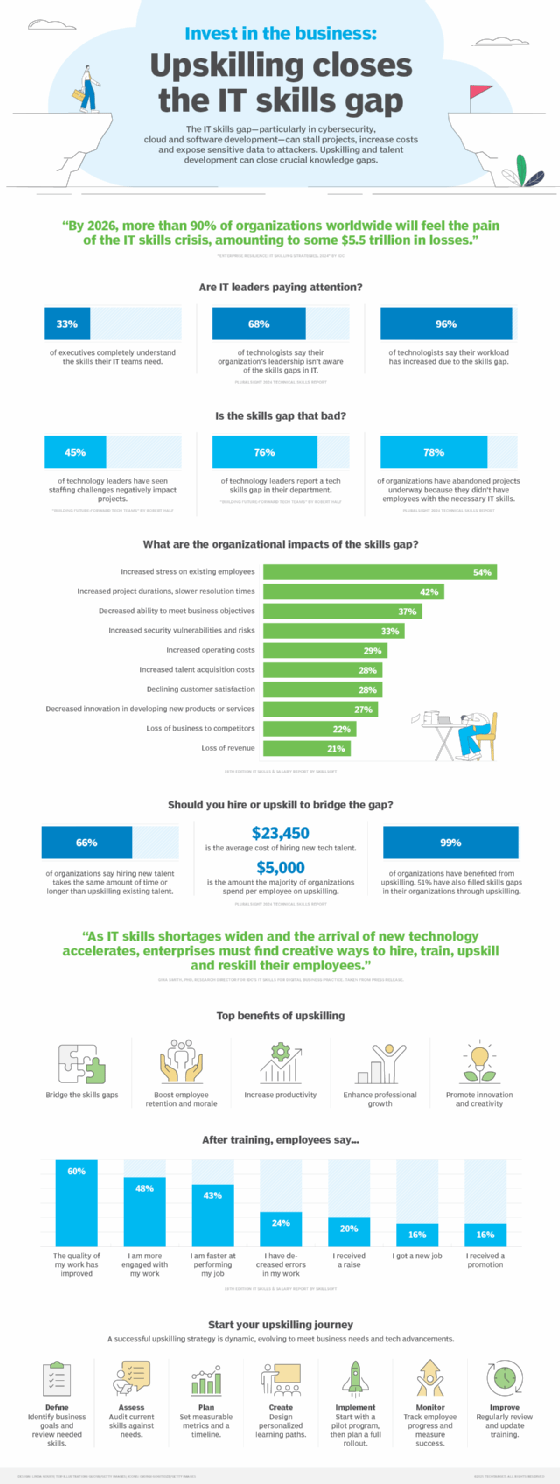By the numbers: How upskilling fills the IT skills gap
IT leaders should not underplay the impact of the IT skills gap. Over 90% of organizations worldwide will feel the pain of the gap by 2026, amounting to $5.5 trillion in losses.

The widening IT skills gap presents significant challenges, reverberating through companies with poor ROI, lower employee morale, slow projects and out-of-reach business objectives. Most organizations can expect $5 trillion in losses from a lack of skills by 2026, according to IDC's "Enterprise Resilience: IT Skilling Strategies, 2024" report.
Talent is out there, but it isn't easy to acquire.
"As IT skills shortages widen and the arrival of new technology accelerates, enterprises must find creative ways to hire, train, upskill and reskill their employees. A culture of learning is the single best way to get there," said Gina Smith, Ph.D., research director for IDC's IT skills for digital business practice, as part of a 2024 report on IT skilling strategies.
The most popular way to close the skills gap is to train -- or upskill -- existing employees. And the number of businesses that plan to provide this training option is rising, from 59% in 2024 to 66% in 2025, according to CompTIA's report on the IT industry outlook for 2025.
Businesses can save money by investing in talent development. Upskilling reduces hiring and recruitment expenses and decreases reliance on external contractors. Employees recognize the value of training. Feedback from Skillsoft's "IT Skills and Salary Report" indicated there are improvements in work quality, engagement and speed that can result in pay awards and promotions.
See how upskilling can help your company succeed.
Fast stats
Review these key statistics on the IT skills gap and insights on how upskilling can help.
Is there an IT skills gap?
- Only 33% of executives completely understand the needed skills for their IT teams. "2024 Technical Skills Report" by Pluralsight.
- 68% of technologists say their organization's leadership isn't aware of the skills gaps in IT. "2024 Technical Skills Report" by Pluralsight.
- 87% of technology leaders face challenges finding skilled talent. And 76% report a tech skills gap in their department. "Building Future-Forward Tech Teams" by Robert Half.
What is the impact of the IT skills gap?
- 45% of technology leaders have seen staffing challenges negatively impact projects. "Building Future-Forward Tech Teams" by Robert Half.
- 78% of organizations have abandoned projects underway because they didn't have employees with the necessary IT skills. "2024 Technical Skills Report" by Pluralsight.
- 96% of technologists say their workload has increased due to the skills gap. "2024 Technical Skills Report" by Pluralsight.
- 54% of organizations say the skills gap increased stress on existing employees, and 42% say it increased project durations and created slower resolution times. "19th Edition IT Skills & Salary Report" by Skillsoft.
Should you hire or upskill?
- 66% of organizations say hiring new talent takes the same amount of time or longer than upskilling existing talent. "2024 Technical Skills Report" by Pluralsight.
- The average cost of hiring new tech talent is $23,450. However, 57% of organizations spend only $5,000 or less per employee on upskilling. "2024 Technical Skills Report" by Pluralsight.
- 99% of organizations have benefited from upskilling. 51% have also filled skills gaps in their organizations through upskilling. "2024 Technical Skills Report" by Pluralsight.
- After training, 60% of employees say the quality of their work has improved, and 43% say they are faster at performing their job. "19th Edition IT Skills & Salary Report" by Skillsoft.
Kathleen Casey is site editor for Informa TechTarget's SearchCloudComputing. She plans and oversees the site, and covers various cloud subjects including infrastructure management, development and security.